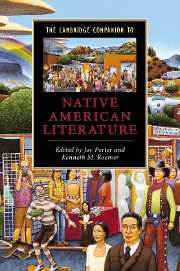Book contents
1 - Historical and cultural contexts to Native American literature
from Part I - Historical and cultural contexts
Published online by Cambridge University Press: 28 May 2006
Summary
Literature tells truths about the past that history cannot articulate. This is a truism with particular resonance in the Native American context because until the watershed years of the late 1960s and early 1970s Indians were either ignored or grossly misrepresented by conventional histories. Typically, histories that did focus exclusively upon Indian concerns limited their approach, either to the history of Indian policy or frontier conflict, or, in the case of anthropological studies, to tribal histories with narratives that ended before 1900. By comparison, Native American literature across time has voiced a different experience of American history. It has voiced a different relationship to historical ''facts'' and a different consciousness of the past itself. Therefore this chapter does more than simply orientate the reader through setting out a version of the Indian past in outline and linking it to aspects of Indian literature. Just as importantly, it considers how the past is conceptualized within Native cultures at the tribal and cross-tribal level and how this has informed the literary projects of specific Native writers.
The great transformative power of Indian literature from any era derives in part from its ability to invoke a past with direct implications for the present. Indians, after all, are not just fictional, they are real. The strength and agency of Indian America today testifies to the survival of diverse Indian nations and individuals in spite of a brutal colonial past. However, the larger context for Indian urban and reservation life remains one of endemic disadvantage rooted firmly in the history of colonialism. Such impoverishment stacks the odds against Native peoples throughout the United States, including within the richer states like Alaska, home to 86,000 natives. The National Academy of Public Administration reported in 1999 that 31 percent of all Indians lived below the poverty line, compared to 13 percent within the US population as a whole. Again in October 2002 the US Census Bureau reported that the lowest US median household income of all was at Buffalo County, South Dakota, home of the Crow Creek Indian Reservation.
- Type
- Chapter
- Information
- The Cambridge Companion to Native American Literature , pp. 39 - 68Publisher: Cambridge University PressPrint publication year: 2005
- 6
- Cited by



